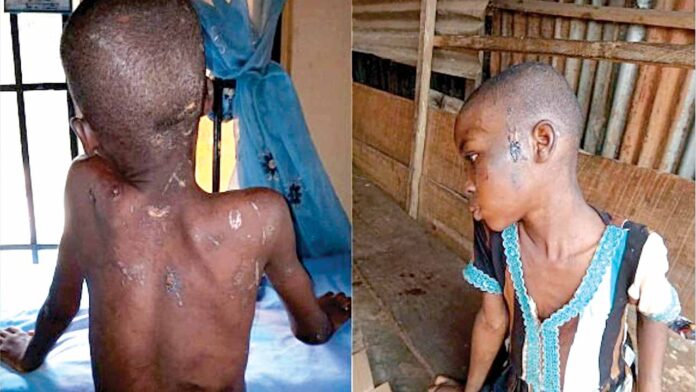Kunle Adesokan, 14, was trafficked from Iseyin in Oyo State to work as a house help at Ilorin, capital of Kwara State in 2019. After spending some time in Ilorin, he moved to Akure, Ondo State, with a middle-aged woman who used him as a house help.
Because his boss only feeds him once daily, he often steals from the kitchen.
In 2022, he was caught stealing meat from his boss’ pot and was battered with a razor blade used to inflict deep cuts on his body.
Like Adesokan, many Nigerian children are experiencing various forms of child labour. While some are engaged in traffic hawking, many work as house helps in various parts of the country.
They are usually moved from their parents or guardians’ home to live with outsiders who engage them for different services which include domestic cleaning, tending cattle, sales boys/girls, and looking after the children of their bosses.
There have, however, been various reports on how these children are poorly treated with little or no remuneration. In cases where they are unable to meet their basic tasks, they are subjected to verbal and physical assaults.
Human rights activists who have handled various cases of child molestation said parents are sometimes promised that their children would be put in school but the reverse is always the case.
The children used as house helps are recruited from rural areas within Nigeria or from neighbouring countries through agents or family members.
The agents often serve as guarantors or buffer between employers and the children. While payments are sometimes made to parents, guarantors are mostly the receivers when the children’s parents are far away.
For instance, a woman identified as Nmesoma Okoye was arrested on March 11, 2021 after beating a 10-year-old maid to death in Anambra.
A 12-year-old house help in Anambra had her intestine ruptured and was also tortured in her privates by Nkechi Bartholomew whom she worked with.
Nkechi inserted sticks into Faith’s private parts and turned them over several times. In the process, her reproductive systems were ruptured leaving Faith needing multiple surgeries.
READ ALSO:
ANALYSIS: Human Rights Shrinking Amid Unlawful Detention Of Terrorism Suspects In Nigeria
ANALYSIS: Will Nigeria Recapture All Kuje Prison Escapees?
From Boarding To Burden: Challenges Of Nigerian Secondary Schools’ Students
In another related incident, Nene Fortune Stephens was arrested in Lagos on April 23, 2020 for torturing her maid to death over a dispute about salary arrears and stealing of noodles.
Abuse of law
The Nigerian Labour Decree of 1974 defines a child as anybody below 15 years of age. More so, section 28 of the Child’s Rights Act adopted in Nigeria in 2003 prohibits exploitative labour of children.
The law states that “no child shall be – (a) subjected to any forced or exploitative labour; or (b) employed to work in any capacity except where he is employed by a member of his family on light work of an agricultural, horticultural or domestic character; or (c) required, in any case, to lift, carry or move anything so heavy as to be likely to adversely affect his physical, mental, spiritual, moral or social development; or (d) employed as a domestic help outside his own home or family environment.”
It also states that any person who contravenes any provision of the law “commits an offence and is liable on conviction to a fine not exceeding fifty thousand naira or imprisonment for a term of five years or to both such fine and imprisonment.
“Where an offence under this section is committed by a corporate body, any person who at the time of the commission of the offence was a proprietor, director, general manager or other similar officer, servant or agent of the corporate body shall be deemed to have jointly and severally committed the offence and may be liable on conviction to a fine of two hundred and fifty thousand naira.”
In addition, section 11 of the act notes that “no child shall be‐ (a) subjected to physical, mental or emotional injury, abuse, neglect or maltreatment, including s3xual abuse; (b) subjected to torture, inhuman or degrading treatment or punishment; (c) subjected to attacks upon his honor or reputation; or (d) held in slavery or servitude, while in the care of a parent, legal guardian or school authority or any other person or authority having the care of the child.”





